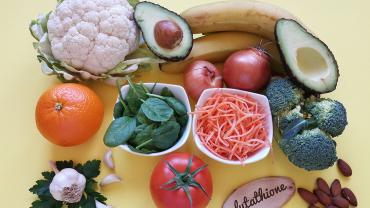
The main intracellular antioxidant, tripeptide glutathione, not only acts as an antioxidant, but it also plays a role in redox signaling, detoxification, cell life, and immune function. Sufficient levels of glutathione support optimal health and many chronic diseases including Alzheimer’s disease and age-related diseases, autoimmune disorders, diabetes, mental health disorders, and infertility, which are all associated with low glutathione status. Consuming the nutrients and phytonutrients involved in the synthesis and recycling of glutathione in either food or supplemental form helps support to ensure adequate glutathione levels to reduce the risk of chronic disease.
The main substrates of glutathione are three conditionally essential amino acids: glycine, cysteine, and glutamic acid. Cysteine is frequently considered the rate-limiting amino acid; however, low levels of glycine may also reduce the ability to adequately synthesize glutathione. However, it takes much more than just these amino acids to ensure high levels of glutathione.
The B vitamins have important supporting roles for glutathione synthesis and metabolism. Cysteine can emerge from methionine metabolism, which creates homocysteine ready to be catalyzed to provide cysteine for glutathione or other purposes. This process requires folate, vitamin B12, and vitamin B6. Vitamins B6 and B12 may also provide support through their roles in adenosine triphosphate (ATP) production, as ATP is required in many of the reactions. B12 deficiency has also been shown to lead to a reduction in glutathione levels. Riboflavin plays a role in the flavin adenine dinucleotide coenzyme involved in the activity of glutathione reductase, and studies have shown an association between lower levels of riboflavin and glutathione.
Glutathione interacts with many of the other important antioxidant nutrients, and studies demonstrate that supplementation with selenium, vitamin E, alpha-lipoic acid, and vitamin C (particularly when deficient) improves glutathione levels and antioxidant capacity. The interactions of the antioxidants differ, with some, such as selenium, acting as a cofactor of glutathione peroxidase and others supporting redox balance and recycling of glutathione.
Certain phytonutrients may also support glutathione levels through their antioxidant properties and other actions. Many polyphenols are metabolized similar to xenobiotics and they may activate the enzyme for the first stage of glutathione synthesis. Studies have found increased glutathione with a diet rich in plant foods, especially cruciferous vegetables that impart a variety of phytonutrients, such as sulforaphane.
Some studies have looked at specific actions of phytonutrients on glutathione levels. For example, quercetin has been shown to increase the glutathione-to-glutathione sulfide ratio for redox balance. This action may initially decrease glutathione levels by forming quercetin–glutathione conjugates while also inducing the nuclear factor erythroid 2-related factor 2 pathway. Quercetin may also protect against oxidative damage, with one cellular study showing pre-treatment with onions, which are rich in phenolic extracts, reduced the oxidative damage by 40% and led to a recovery of glutathione levels by 15% to 22%.
Many essential nutrients and phytochemicals play a role in glutathione balance. Consuming adequate protein, especially the amino acids glycine and cysteine, in addition to colorful plants rich in vitamins, minerals, and phytonutrients can help ensure adequate substrates available for glutathione synthesis and cycling. Also, taking supplements targeting potential deficiencies in one or more of these supportive nutrients can increase glutathione levels for those who may be at a greater risk of glutathione deficiency and the associated diseases.
By Kendra Whitmore, MS, CNS